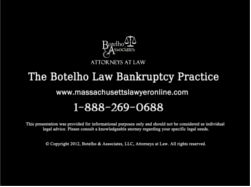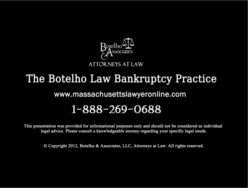Chapter 7 Bankruptcy - Part 2 | Fall River
Joseph Botelho
Chapter 7
What is Chapter 7 bankruptcy? The most common form of individual bankruptcy is Chapter 7 bankruptcy of the U.S. bankruptcy code. The U.S. bankruptcy codes are under the jurisdiction of federal law, not that of state law.
Liquidation Bankruptcy
Chapter 7 bankruptcy is known as liquidation bankruptcy or fresh start bankruptcy. Liquidation refers to the requirement of an individual to surrender all non-exempt assets to the U.S. Bank Trustee for sale. The proceeds of these sales are then used to pay back creditors based on priority, which is set forth by the U.S. bankruptcy code. This is what is referred to as liquidation. It is important to understand that a Chapter 7 bankruptcy only requires that individuals liquidate non-exempt assets in Chapter 7 bankruptcy cases. Most, if not all, assets are exempt and can be used in your fresh start in a Chapter 7 bankruptcy case. Learning which assets are exempt will help you determine if Chapter 7 bankruptcy is right for your particular situation.
Choosing Chapter 7 Bankruptcy
A bankruptcy attorney can help you determine if your situation would benefit from Chapter 7 bankruptcy or from an alternative, such as Chapter 13 bankruptcy, debt settlement, or a mortgage modification. The main reason most individuals file Chapter 7 bankruptcy is because their debts are discharged and the individual does not have to pay them back. This gives the individual a chance to make a fresh start without having the burden of debts which they do not have the ability to repay.
Before you decide to file Chapter 7 bankruptcy, always receive counseling from a qualified bankruptcy attorney. Another important aspect of Chapter 7 bankruptcy is determining the right time to file. A bankruptcy attorney after a thorough examination of your debts, expenses, and assets can help you determine when the best to file Chapter 7 bankruptcy is.
For more information on Chapter 7 bankruptcy, Chapter 13 bankruptcy, unsecured debt settlement, and obtaining a mortgage modification please visit our website at www.massachusettslawyeronline.com or to schedule a free consultation call the Law Offices of Botelho & Associates at 1-888-269-0688.
By: Joseph Botelho
Chapter 7
What is Chapter 7 bankruptcy? The most common form of individual bankruptcy is Chapter 7 bankruptcy of the U.S. bankruptcy code. The U.S. bankruptcy codes are under the jurisdiction of federal law, not that of state law.
Liquidation Bankruptcy
Chapter 7 bankruptcy is known as liquidation bankruptcy or fresh start bankruptcy. Liquidation refers to the requirement of an individual to surrender all non-exempt assets to the U.S. Bank Trustee for sale. The proceeds of these sales are then used to pay back creditors based on priority, which is set forth by the U.S. bankruptcy code. This is what is referred to as liquidation. It is important to understand that a Chapter 7 bankruptcy only requires that individuals liquidate non-exempt assets in Chapter 7 bankruptcy cases. Most, if not all, assets are exempt and can be used in your fresh start in a Chapter 7 bankruptcy case. Learning which assets are exempt will help you determine if Chapter 7 bankruptcy is right for your particular situation.
Choosing Chapter 7 Bankruptcy
A bankruptcy attorney can help you determine if your situation would benefit from Chapter 7 bankruptcy or from an alternative, such as Chapter 13 bankruptcy, debt settlement, or a mortgage modification. The main reason most individuals file Chapter 7 bankruptcy is because their debts are discharged and the individual does not have to pay them back. This gives the individual a chance to make a fresh start without having the burden of debts which they do not have the ability to repay.
Before you decide to file Chapter 7 bankruptcy, always receive counseling from a qualified bankruptcy attorney. Another important aspect of Chapter 7 bankruptcy is determining the right time to file. A bankruptcy attorney after a thorough examination of your debts, expenses, and assets can help you determine when the best to file Chapter 7 bankruptcy is.
For more information on Chapter 7 bankruptcy, Chapter 13 bankruptcy, unsecured debt settlement, and obtaining a mortgage modification please visit our website at www.massachusettslawyeronline.com or to schedule a free consultation call the Law Offices of Botelho & Associates at 1-888-269-0688.
By: Joseph Botelho



